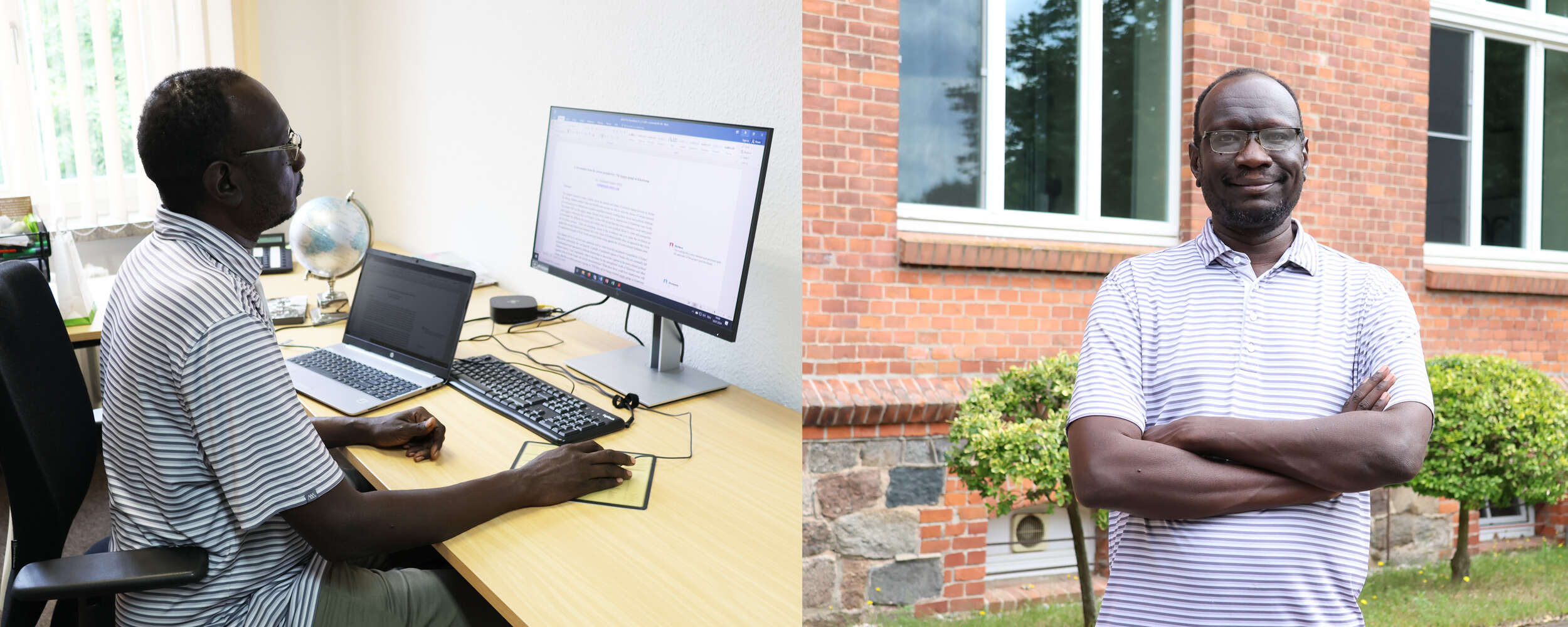Research in Exile: Interview with a Sudanese Scholar
23. Jul. 2024 / Science & Research

Friedensau Adventist University is hosting Dr. Mohamed Bakhit, a scholar supported by the Philipp Schwartz Initiative for Endangered Scientists. Dr. Bakhit, an Associate Professor at the University of Khartoum, Sudan, is conducting significant research on Sudanese refugees in Kampala, Uganda.
We have interviewed Dr. Mohamed Bakhit to learn more about his work and experiences. Daniel Offei, a master’s student in Development Studies, conducted the interview.

DANIEL
Welcome, Dr. Mohamed Bakhit. It is very nice to have you here. To start, could you please introduce yourself?

DR. BAKHIT
Thank you, Daniel. My name is Mohamed Bakhit, and I am from Sudan. I work as an Associate Professor at the University of Khartoum, specializing in social anthropology with a focus on migration and refugees. My academic experience here in Germany began with a PhD from University of Bayreuth, focusing on identity construction in multi-ethnic shantytowns in Khartoum. Following this, I studied South Sudanese refugees in a postdoctoral study funded by Volkswagen Foundation in 2016-2019. The recent war in Sudan made me a refugee, deepening my interest in this field.

DANIEL
Why did you come to Friedensau and how long do you plan to stay?

DR. BAKHIT
The decision to come to Friedensau was part of a post-doctoral study funded by the Alexander von Humboldt Foundation’s Philipp Schwartz Initiative, which supports researchers at risk. This is because I had to leave my country and became a refugee after the war there. So, I will be hosted here in Friedensau to do my research.

DANIEL
How specifically have the Alexander von Humboldt Foundation and the Philipp Schwartz Initiative contributed to your research?

DR. BAKHIT
The foundation has provided a scholarship for two years, extendable to three, which covers my stay in Friedensau, my fieldwork in Uganda, and the publication of my research. Additionally, being part of the Alexander von Humboldt Foundation’s post-doctoral network offers significant professional benefits, including building connections with researchers globally.

DANIEL
Can you tell us about the research you intend to conduct?

DR. BAKHIT
My research is entitled "Refugees in Kampala: Citizenship Challenges and Refugee System" and focuses on Sudanese who have become refugees in Uganda due to the war that started in April 2023. There are about 8 million internally displaced people in Sudan and 2 million refugees in neighbouring countries, mainly in Egypt and South Sudan, Ethiopia and a few thousands in Uganda. I am interested in how these Sudanese refugees are adapting to life in Uganda and how they are navigating this whole "refugee system", dealing with new customs, regulations and the challenges they face. Special attention will be given to the different categories of refugees, such as low-class and middle-class, and their specific needs. The war started in the capital, which is unusual, so many of the refugees are from middle-class backgrounds. They are not the traditional refugees who need to be placed in camps. They are looking for education for their children, good jobs, and opportunities to use their skills. It's a different kind of refugee experience.

DANIEL
What impact do you hope to achieve with your research?

DR. BAKHIT
There are different categories of refugees, and they have different needs. The international NGOs and other organizations working with the refugees need to adapt to this. The primary aim is therefore to shed light on the challenges faced by Sudanese refugees and provide recommendations to organizations like UNHCR. This will help these organizations to better understand the refugee population and address their needs effectively.

DANIEL
When did you arrive at Friedensau and what are your first impressions of the university?

DR. BAKHIT
I arrived on 25th of June. The campus offers a quiet and conducive environment for research. It also provides a stable and safe place for my family, which is crucial after the frequent relocations we have experienced. My children have finally found a place they enjoy.

DANIEL
Are you receiving support from Friedensau Adventist University?

DR. BAKHIT
Yes, absolutely. The Faculty of Social Science has been incredibly supportive. Professor Ulrike Schultz is my mentor, and I receive a lot of support from her and all my colleagues. The office space and resources I have are on par with those provided to the teaching staff. I’ll also be teaching here, particularly in courses related to migration, refugees, and forced migration, alongside my research.
And, on top of that, the support extends to my family as well. We have settled on campus, and everyone is very comfortable with the housing arrangements.

DANIEL
Would you like to add anything else about your research?

DR. BAKHIT
My appreciation goes to the Philipp Schwartz Initiative and Friedensau Adventist University for their support. The journey to get here has been challenging, but the university’s administration has been very supportive. The teaching here will also enhance the research by sharing findings with the students and learning from their experiences.

DANIEL
Thank you, Dr. Mohamed Bakhit, for your time. Once again, welcome to Friedensau. It is great to have you here.

DR. BAKHIT
Thank you. I appreciate it.